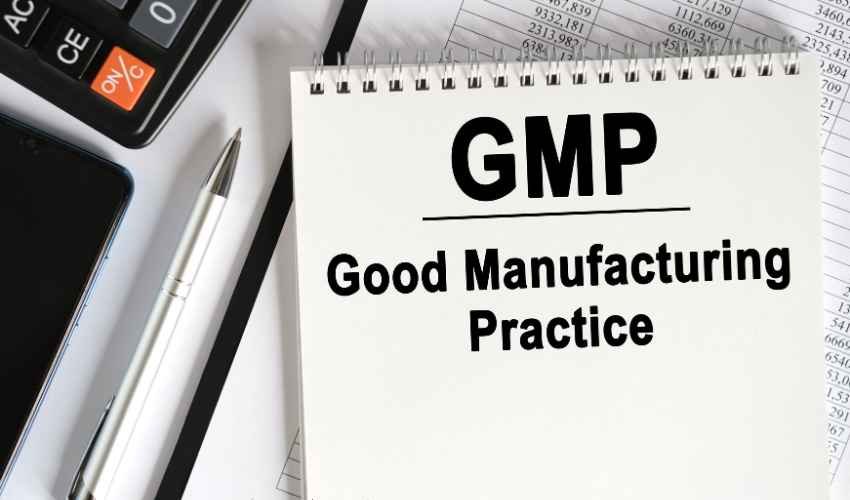
BLOG

What Is GMP Definition?
GMP definition, Good Manufacturing Practices, is a system designed to ensure that products are consistently produced and controlled according to quality standards. It applies to various industries, including food, pharmaceuticals, cosmetics, and dietary supplements, to ensure product safety and quality. This article explains the definition of good manufacturing practices, their significance in the food industry, how to obtain GMP certification, and the importance of Good Manufacturing Practices training.
What Does GMP Stand For?
GMP stands for Good Manufacturing Practices, a set of guidelines that provide the foundation for safe and effective manufacturing processes. These practices focus on cleanliness, process control, and product consistency, aiming to minimize risks such as contamination and production errors.
What Is GMP definition?
GMP definition refers to regulatory guidelines that ensure products are manufactured in a clean and controlled environment. These practices encompass every aspect of production, including:
- Facility design and cleanliness.
- Personnel hygiene and training.
- Equipment maintenance and validation.
- Process documentation and record-keeping.
- Quality assurance and risk management.
By following good manufacturing practices, companies ensure that their products meet safety, quality, and regulatory standards.
What Is GMP definition in the Food Industry?
In the food sector, GMP definition focuses on maintaining hygiene and controlling risks during production, storage, and distribution. Adhering to good manufacturing practices guidelines helps prevent foodborne illnesses, contamination, and regulatory violations. Specific aspects of GMP in food industry include:
- Proper cleaning and sanitation.
- Allergen management.
- Consistent quality checks during manufacturing.
How to Get GMP Certification?
Obtaining a Good Manufacturing Practices certificate involves several steps:
Understand GMP definition and Guidelines
Familiarize yourself with good manufacturing practices guidelines applicable to your industry.
Assess Current Operations
Conduct a self-assessment or GAP analysis to identify areas of non-compliance.
Implement Changes
Upgraded facilities, trained staff, and established proper documentation processes to align with GMP definition.
Hire a GMP Consultant
Consider engaging an expert to help navigate complex compliance requirements.
Schedule an Audit
Apply for a third-party audit from a recognized certification body to assess your compliance.
Obtain Certification
Upon passing the audit, you’ll receive your GMP certification.
How to Get GMP Certified?
To achieve GMP certification, companies must demonstrate compliance with regulatory requirements during an official inspection. Key steps include:
- Developing a quality management system aligned with Good Manufacturing Practices standards.
- Training employees on good manufacturing practices.
- Conducting internal audits to prepare for the certification process.
- Addressing any non-conformities identified during the audit.
What Is GMP Training?
GMP training is a program designed to educate employees on good manufacturing practices. It ensures all staff members understand their roles in maintaining safety, cleanliness, and compliance. Training covers topics such as:
- Hygiene practices and contamination prevention.
- Process validation and equipment handling.
- Record-keeping and quality control procedures.
Investing in GMP training helps businesses minimize risks and maintain consistent quality.
Conclusion
GMP is essential for ensuring product safety, quality, and regulatory compliance across industries. By understanding the GMP Definition, good manufacturing practices, undergoing GMP training, and pursuing certification, businesses can build trust, reduce risks, and maintain operational excellence. Adherence to these guidelines is critical for success, whether in the Good Manufacturing Practices sector or the GMP in the food industry.

GMP Definition FAQs
What does GMP stand for?
GMP stands for Good Manufacturing Practices, a system for ensuring product quality and safety.
What is GMP definition?
GMP definition refers to guidelines that regulate the manufacturing process to prevent contamination and ensure consistency.
What is GMP training?
GMP training educates employees on maintaining cleanliness, following processes, and ensuring compliance with regulatory standards.
How do I get GMP certified?
Align your processes with GMP guidelines, conduct audits, and pass an inspection by a recognized certification body.
How long does GMP certification last?
Typically, GMP certification is valid for 1-3 years, depending on the industry and certifying body.
Why is GMP important in the food industry?
GMP definition ensures food safety by controlling contamination risks and maintaining hygiene during production and storage.
What are good manufacturing practices guidelines?
These guidelines cover hygiene, equipment validation, quality control, and process documentation to ensure safe production.
How much does GMP certification cost?
Costs vary based on company size, scope of operations, and the certifying organization but can range from $5,000 to $15,000.
What industries require GMP certification?
Industries like food, pharmaceuticals, dietary supplements, and cosmetics require GMP certification for regulatory compliance.
Can GMP training be taken online?
Yes, many organizations offer GMP training online for convenience and accessibility.
